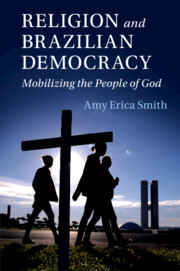Book contents
- Religion and Brazilian Democracy
- Cambridge Studies in Social Theory, Religion, and Politics
- Religion and Brazilian Democracy
- Copyright page
- Dedication
- Contents
- Figures
- Tables
- Acknowledgments
- Part I Introduction
- Part II What Clergy Think, Say, and Do
- 4 What Clergy Think and Say: Religious Teachings and Political Views
- 5 What Clergy Do: Encouraging Partisan and Electoral Politics
- Part III How Congregants Respond
- Part IV Representation
- Afterword
- Book part
- References
- Index
- Books in the Series (continued from p. ii)
5 - What Clergy Do: Encouraging Partisan and Electoral Politics
from Part II - What Clergy Think, Say, and Do
Published online by Cambridge University Press: 15 March 2019
- Religion and Brazilian Democracy
- Cambridge Studies in Social Theory, Religion, and Politics
- Religion and Brazilian Democracy
- Copyright page
- Dedication
- Contents
- Figures
- Tables
- Acknowledgments
- Part I Introduction
- Part II What Clergy Think, Say, and Do
- 4 What Clergy Think and Say: Religious Teachings and Political Views
- 5 What Clergy Do: Encouraging Partisan and Electoral Politics
- Part III How Congregants Respond
- Part IV Representation
- Afterword
- Book part
- References
- Index
- Books in the Series (continued from p. ii)
Summary
- Type
- Chapter
- Information
- Religion and Brazilian DemocracyMobilizing the People of God, pp. 80 - 96Publisher: Cambridge University PressPrint publication year: 2019



